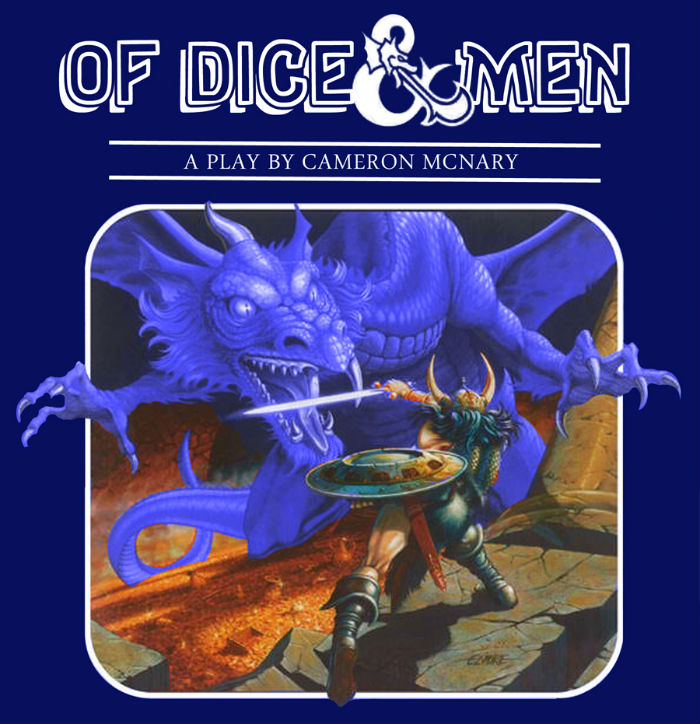 Of Dice & Men
Of Dice & Men
Written by Cameron McNary
Directed by Amy Overman
Starring Gyda Arber, Rob Brown, Cedric Jones, Justin Plowman, Amy Beth Sherman, and Adam Swiderski.
Presented by the Dysfunctional Theatre Company at The Brick Theater (575 Metropolitan Avenue, Brooklyn, New York).
7-27 July 2012.
For tickets call 866-811-4111 or visit www.bricktheater.com.
120 minutes (including one intermission).
Surprisingly moving. That’s my two-word review. Go, see the play; it’s good.
Oh, you want to know a little more? Well, like the quasi-narrator John Francis, I can tell you more. Of Dice & Men is the story of six people who play Dungeons & Dragons together, and what happens when one of their number does something that angers them. How do you react when a good friend tells you he’s going to do something that makes you so angry you want to hit him? Worse, it’s something that is only good and honorable: there’s absolutely nothing wrong with what your friend is going to do, except that it’s going to tear him away from you, and that makes you very angry?
Well, that’s the question discussed in this play.
And while the dissection of that question, and several characters’ answers to it, could make for a very heavy evening, first-time playwright Cameron McNary has instead given us a pleasant two hours with characters who could be our friends or ourselves (assuming you have any background in role playing games). There are very weighty moments, but it’s a weighty question, deserving of some respect. But there are also light-hearted moments, and the whole thing hangs together remarkably well.
As for the actual staging: it’s an intimately small theatre (50 seats), but there’s a great feeling of community in it. From the way the stage manager bounds on-stage to introduce the evening, to the count-down clock running during the intermission. It’s a nice feeling.
The set is minimal: most of the story comes from the script, the believable characters, and the very few props. But there are also some features not found in every play. For instance, narrators in theater may be an acquired taste. I happen to love them, when they’re done well. The narrator in this case is used properly: giving background when necessary, setting scenes that are otherwise actors on a bare stage, allowing us to jump back and forth through time to get to know the characters at different life stages.
An extension of the narrator concept is breaking the fourth wall. Rather than simply describing what’s happening to some hypothetical audience, the characters on stage discuss what’s happening with this audience, here and now. Some people like it, some don’t. It may make the play-watching experience more intimate than most audience members are ready for. In this case, it starts out slowly, with the narrator telling the audience what’s going on, and giving background. But then the other characters start interacting with the audience as well, and it’s charming.
As I said at the beginning, it’s a surprisingly moving play: I truly cared about these characters. I felt John Alex’s anger at his friend’s impending departure, my heart rose and fell with the tentative steps toward romance experienced by John Francis and Tara, and I understood the need and pride Jason felt in his decision. I was also caught up the characters’ characters’ stories, when they were presented on stage: the halfling, the wizard, the paladin, even the dungeon master. On a lighter note, Tara’s final speech is also surprisingly moving (in another manner). But these are characters I would want to get to know (well, I probably already know them) telling a very good story. If you have the opportunity, see Of Dice & Men.